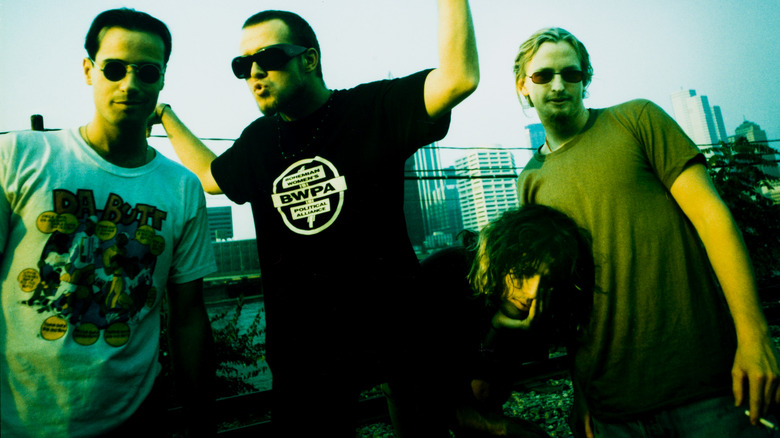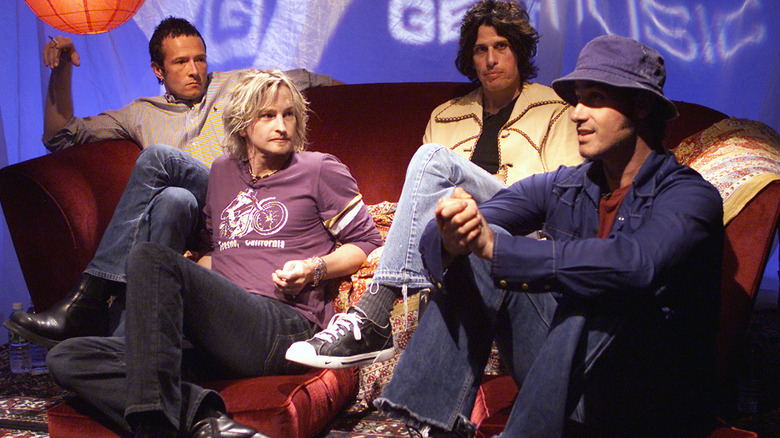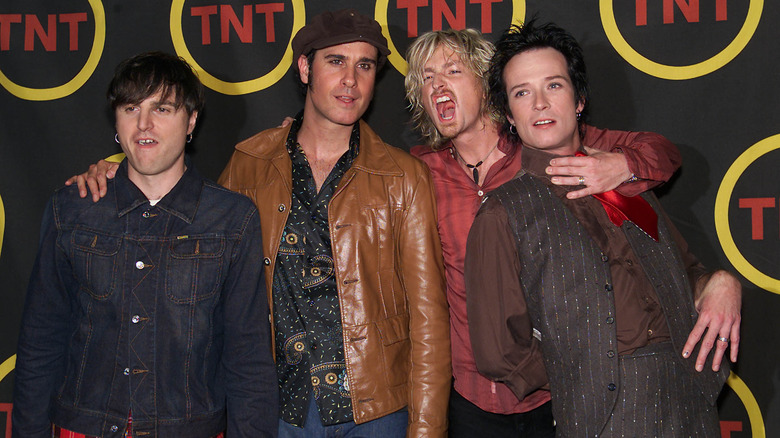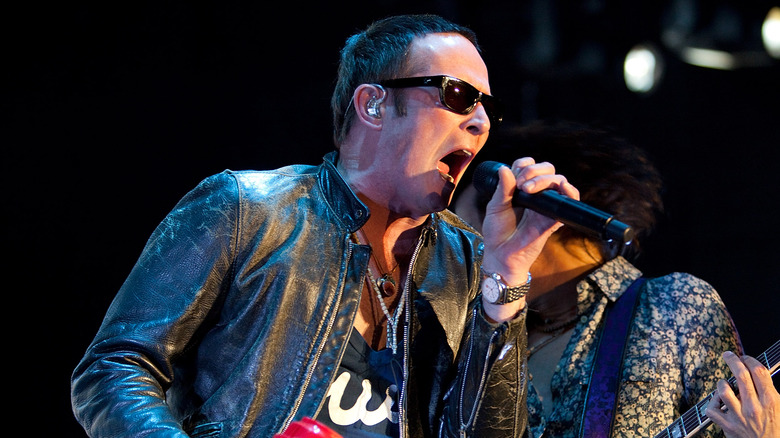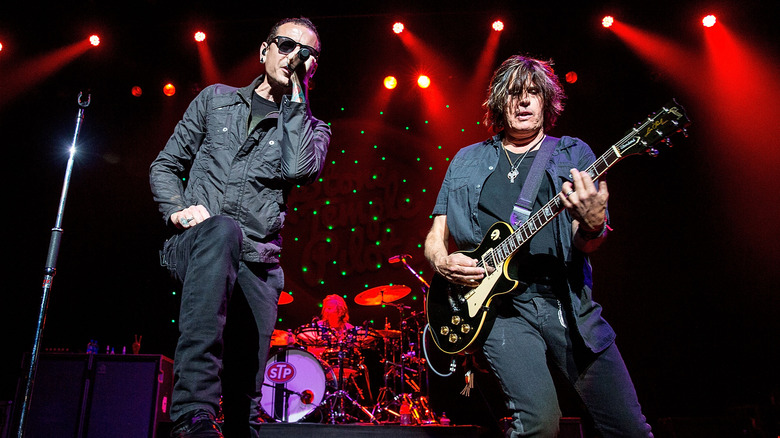The Tragic Real-Life Story Of Stone Temple Pilots
As grunge was enjoying its zenith in the early 1990s, a number of non-Seattle-based bands rose to stardom as they were lumped into the scene. These bands included San Diego's Stone Temple Pilots, whose 1992 debut album "Core" made a slow, steady climb to No. 3 on the Billboard 200 and produced rock hits such as "Sex Type Thing," "Plush," and "Wicked Garden." Then again, it may be unfair to classify them solely as a grunge band, as STP — originally consisting of singer Scott Weiland, guitarist Dean DeLeo, bassist Robert DeLeo, and drummer Eric Kretz — had an unusually diverse range of influences, many of which were already evident on "Core" but some others not quite obvious until later releases.
At the moment, Stone Temple Pilots is still going strong, with relative unknown Jeff Gutt stepping into the big shoes left by former frontmen Weiland and Chester Bennington (via the San Diego Union-Tribune) and the band still making new music on a consistent basis. The hits may not be as plentiful as they were in the 1990s, or even the early 2000s, but the fact that STP has kept going despite the many personal and professional challenges they've faced through the years is quite impressive in and of itself. Here's a closer look at some of the more notable of these challenges, starting with one that involved the very first song they released as a single.
Their first single was very controversial
Despite only peaking at No. 23 on Billboard's Mainstream Rock charts, Stone Temple Pilots' first single, "Sex Type Thing," would go on to be one of the band's all-time classic recordings. But if you come to think of it, part of its middling performance on the charts might have been due to the controversy surrounding its lyrics. The song was written in the first person, and as a result of this, many thought that Scott Weiland and his bandmates were glorifying rape when their intention was the exact opposite. The frontman was, in fact, an advocate of women's rights who wrote the song not about sex, but rather about "control, violence, and [the] abuse of power."
Speaking to Rolling Stone in 1993 (via Below Empty), Weiland lamented how STP had become the latest target of moral guardians following the controversy over Body Count's police-bashing "Cop Killer." He explained that "Sex Type Thing" was written from the point of view of the "typical American macho jerk" because he wanted to avoid sounding preachy about a topic he felt strongly about. "I never thought that people would ever seriously think that I was an advocate of date rape," the singer continued.
If you or anyone you know has been a victim of sexual assault, help is available. Visit the Rape, Abuse & Incest National Network website or contact RAINN's National Helpline at 1-800-656-HOPE (4673).
STP was often derided by music critics for various reasons
Being that they hailed well over a thousand miles from Seattle and oftentimes had a sound reminiscent of the city's soon-to-be iconic grunge bands, Stone Temple Pilots got a lot of undeserved flak early on for allegedly chasing what was rock's most popular trend at the moment. It probably didn't help much that on their first two albums, Scott Weiland sang in a deeper voice than he would on most of STP's later releases, arguably making him sound a little too close for comfort to the likes of Pearl Jam's Eddie Vedder and Alice in Chains' Layne Staley.
Perhaps the most famous diss thrown STP's way came from author Neil Strauss, who, in 1996, opined that the band has a reputation of being "popular grunge imitators" in his New York Times review of their third album, the decidedly different-sounding "Tiny Music: Songs from the Vatican Gift Shop." Even if he did acknowledge how the group was distancing itself from its roots, Strauss still found time to blast STP for failing to "establish a sound that distinguishes them from their influences," wrapping up his review by referring to "Tiny Music" as "mediocrity at its best."
The critical barbs kept coming even in the early 2000s, when Observer called Weiland "The Talented Mr. Ripoff" for his early attempts to sound like Vedder, then poked fun at how the singer's idea of a "vintage STP" effort on their 2001 album "Shangri-La Dee Da" was closer to "vintage Alice in Chains." More pointedly, the outlet accused Stone Temple Pilots of "never [having] integrity" and for generally trying too hard on the new record to diversify their influences and sound more eclectic. Guess you just can't please everyone ...
The truth behind their temporary split in 2003
After five studio albums and close to 15 years together as a band, Stone Temple Pilots decided to call it a day in 2003. At that point, the band was seeing diminishing commercial returns with each subsequent release, and Scott Weiland's drug problems and frequent run-ins with the law were taking their toll on his bandmates more than ever (via The Recorder Online). Everything came to a head when Weiland and Dean DeLeo exchanged blows during the last date of STP's fall 2002 tour. That, according to the outlet, "effectively" closed the book on STP's career, though it was only a year later when their disbandment became official.
In an interview with Guitar One (via Blabbermouth), Dean and Robert DeLeo delivered the news that no STP fan wanted to hear but stressed that the decision was partly driven by the "cheese factor" with a band of men nearing their 40th birthdays (or slightly past their 40th birthday, in Dean DeLeo's case) trying to "recapture glory" onstage. However, Dean also seemed to acknowledge his fistfight with Weiland, explaining that the disbandment allowed them to "look at each other with an entirely different view." Younger brother Robert then referenced the many times Weiland's drug use had threatened to affect the band's productivity, even during the recording of 1994's sophomore effort "Purple" and "Tiny Music" two years later. "Drugs ain't a good thing," the bassist continued. "I'm not trying to be square ... It got in the way. Denial's a strong thing. We all got very frustrated."
If you or anyone you know is struggling with addiction issues, help is available. Visit the Substance Abuse and Mental Health Services Administration website or contact SAMHSA's National Helpline at 1-800-662-HELP (4357).
Scott Weiland sued STP after he was fired in 2013
During their time apart, the members of Stone Temple Pilots worked on various projects, with Scott Weiland most memorably fronting hard rock supergroup Velvet Revolver. But thanks in large part to Weiland's then-wife, Mary Forsberg, STP eventually got back together, confirming their reunion in 2008 by announcing a massive 65-date summer tour (via MTV). Curiously, the announcement came about one week after Velvet Revolver fired Weiland for his "increasingly erratic onstage behavior and personal problems."
Stone Temple Pilots' self-titled sixth album (their first of two) went all the way to No. 2 on the Billboard 200 in June 2010, and for some time, all seemed well. Unfortunately, rumors began to swirl about two years later, claiming that STP had axed Weiland. The singer denied all of them, but on February 27, 2013, the band officially announced his dismissal through a one-sentence statement that didn't specify any reasons for his firing (via Spin).
Months later, it became clearer why STP decided to part ways with its longtime frontman. Per USA Today, the band sued Weiland toward the end of May 2013 for no-showing promotional events, showing up late to concerts, and co-opting their plans to perform "Core" on tour in its entirety (in celebration of the album's 20th anniversary) for his own solo tour. Weiland counter-sued about a week later, alleging that the rest of STP conspired to dismiss him despite his status as their founder, lead singer, and chief lyricist.
The band's two iconic frontmen died tragically young
Stone Temple Pilots quickly moved on after firing Scott Weiland, hiring Linkin Park frontman Chester Bennington as their new lead singer, and releasing the EP "High Rise" in October 2013. Weiland, meanwhile, kept playing music with his new backing band, the Wildabouts, doing so until his tragic death on December 3, 2015, at the age of 48. No cause of death was announced at first for the singer, who was found dead on his tour bus during a stop in Bloomington, Minnesota. However, county officials confirmed on December 18 that Weiland died of an accidental overdose of cocaine, alcohol, and MDA, as reported by Rolling Stone.
Tragedy would strike STP again only two years after Weiland's death, as Bennington died by suicide on July 20, 2017. The frontman, who was only 41 when he died, returned full-time to Linkin Park after his brief stint with Stone Temple Pilots ended in 2015, releasing the album "One More Light" just two months before his passing.
Although Dean DeLeo chose not to talk in detail about "Finest Hour," a track off STP's 2018 self-titled album, in an interview with the San Diego Union-Tribune, the outlet speculated that the song's lyrics pertain to Weiland and Bennington, what with lines such as "You never said goodbye" and "A darkness hid inside."
If you or anyone you know is having suicidal thoughts, please call the National Suicide Prevention Lifeline at 1-800-273-TALK (8255).

